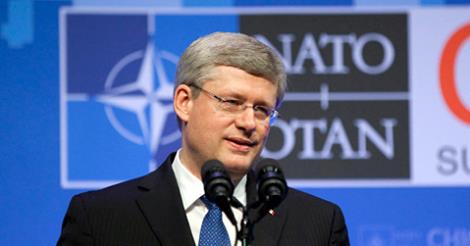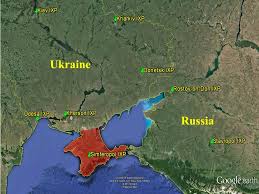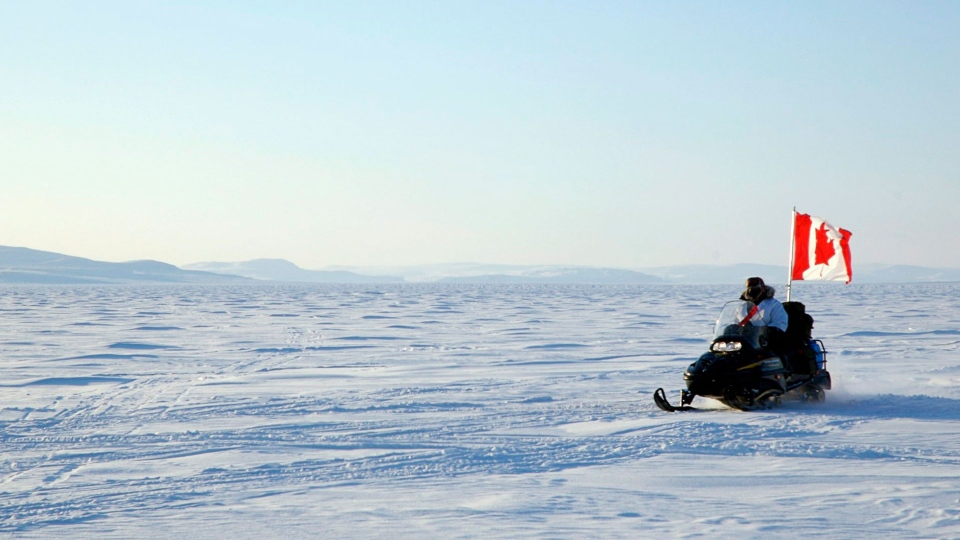 By Ray Rivers
By Ray Rivers
September 3, 2014
BURLINGTON, ON
Prime Minister Harper has been among the strongest opponents to Russian aggression in the Ukraine. And now he is being asked to belly-up to the NATO bar – put his money where his mouth is – and raise Canada’s spending on defence to a full 2% of GDP, the prescribed level for defence spending. Canada currently spends about 1.3 percent of its GDP on the military, some $22 billion in 2012. Getting to 2% would cost us at least another twelve billion a year. And that would wreak havoc with Mr. Harper’s plan for a balanced budget come election time next year

Prime Minister Stephen Harper has always been a strong NATO supporter – except when it comes to our financial commitment. Canada has some significant sovereign interest in the far North – we may one day need strong NATO support.
Canada is not the only slacker. For example, Germany’s defence spending is 1.4% of its GDP, and together the two nations are trying to block a new resolution mandating the 2% level. By comparison the USA spends almost 4.5% of its economy (GDP) on defence, about the same percentage as Russia and twice as much as China. In fact, the US spends more on defence than the next 10 nations combined, and over seven times as much as Russia. America is also the largest contributor to NATO, providing almost a quarter of the association’s budget, over $700 million in 2010.
“To keep the Russians out, the Americans in, and the Germans down” was how the first Secretary General of the North American Treaty characterized NATO’s purpose at its founding in 1949. In addition to the 28 member states there are an additional 37 participating in some sort of partnership arrangement, which included Russia until recently. In total NATO members are responsible for roughly 70% of all global spending on military activities. It is an ‘all-for-one’ and ‘one-for-all’ club, although the invasion of Ukraine has some worrying that it might have soured into an ‘every-one-for-themselves’ club.
For forty years NATO provided an effective deterrent against a hypothetical Soviet invasion, we believed. Then looking for a new lease on life following the collapse of the Soviet Union, it extended its reach to engage in non-NATO area missions in Bosnia, Kosovo, Afghanistan and Libya. Ukraine, which had served with NATO members for most of these conflicts, as well as in Iraq, had received conditional admission into NATO in 2008. However, following election of a new president it withdrew the application and claimed non-aligned status. Then came the citizens’ revolt and impeachment this year; and Russia invaded to show its displeasure, to grab a naval base, and to deter Ukraine from joining the EU.
So NATO members are meeting this week to contemplate their raison d’être and decide what to do about a Russia, which until recently had been embraced as a partner, but whose leader is now being compared to Adolf Hitler. Canada’s PM, a hawk on Russia will be demanding that NATO supply arms to Ukraine, at a minimum, and his plea will be echoed by those former Soviet dominated nations on or near Russia’s border. Canada to its credit has already sent non-lethal military supplies and offered loan guarantees to Ukraine.
But Germany’s Merkel, who was born in East-Germany, and Obama keep repeating this meaningless mantra that ‘there isn’t a military solution’, to what is, after all, a military problem. So anticipate a deadlock at this week’s meeting with Germany and the US blocking arms supply, and in turn calling for more sanctions, notwithstanding that the sanctions to date have been totally ineffective at deterring Russian aggression.
Sanctions have been used very effectively in the past, South Africa being a classic example. But for an ambitious, supposedly virile, shirtless ‘he-man’ and former KGB agent turned president, intent on re-creating the Tsarist empire of the past, sanctions are for pussies. Putin’s militaristic nationalism has been popular back home. And he continues to dig himself into a hole while he aggresses to the applause of a nation restricted to a one-sided story – a nation which is moving progressively towards becoming a Soviet-style police state again.

How much of this part of the world do the Russians want? And at what point will NATO decide enough is enough
The west, it can be argued, might have stopped Putin in his tracks had they shown strength from the beginning. Deterrence rather than meaningless threats and ineffective sanctions might have discouraged Russian adventurism in eastern Ukraine. Instead, naive appeasement has merely served to embolden Putin and to further enable him to commit more aggression, as we have seen. What was preventable in March has become an eventuality today.
Ukraine has announced that it plans to again seek NATO membership. Nobody is really sure how membership would apply or what it would mean for a nation already at war and partially occupied by Russia, so it probably won’t happen in the near future. And NATO may be content just to publish updated reports on the Russian invasion, all the while issuing empty threats as we watch Russia annex whatever it wants of Ukraine, and maybe some other states while it is at it.
There has been an announcement on the creation of new NATO military bases in the former Soviet republic/satellites, though they will not be staffed for fear of violating some 1997 treaty with Russia. But Putin, who has broken a score of international agreements and laws on his pathway to building his empire, will no doubt object anyway. A good offence can better a poor defence, as he once chronicled…“Once I spotted a huge rat and pursued it down the hall until I drove it into a corner,…It had nowhere to run. Suddenly it lashed around and threw itself at me. I was surprised and frightened. Now the rat was chasing me.” (V. Putin)

Canada shares a border with Russia in the arctic – where there are rich mineral resources. Canada
Stephen Harper has been right on this issue from the beginning but it is questionable whether he can make the case for NATO to actually meet Russian aggression with action. His credibility will be diminished if he is seen as a laggard in meeting Canada’s contributions to our own defence (the 1.3% of GDP). And it is not that we don’t need to enhance our military, particularly in the north. We are totally outgunned by our major competitor, Russia, be it in the air, on or under the sea.
If nothing else comes out of the NATO meeting in Wales this week our PM needs to return with a commitment to raise Canada’s capacity to defend itself – and that defence will be in the north, against a resurgent and aggressive Russia. After all, defending Canada’s sovereignty in the north has long been one of Mr. Harper’s goals, and once again on this issue he is dead right.
Military Spending
Canada’s Spending NATO Spending Military Money Kosovo
 Ray Rivers writes weekly on both federal and provincial politics, applying his more than 25 years as a federal bureaucrat to his thinking. Rivers was a candidate for provincial office in Burlington where he ran against Cam Jackson in 1995, the year Mike Harris and the Common Sense Revolution swept the province.
Ray Rivers writes weekly on both federal and provincial politics, applying his more than 25 years as a federal bureaucrat to his thinking. Rivers was a candidate for provincial office in Burlington where he ran against Cam Jackson in 1995, the year Mike Harris and the Common Sense Revolution swept the province.



















I think that a look into the possible increase in defense spending under the recent and current circumstances is warranted. I believe that all countries threatened by the terrorists and their allies need to discuss next steps and what is required. If it means upping the defense spending by less than 1% more that sounds reasonable to me considering the alternative. Also it seems we need to keep an eye on our northern border shared with Russia given their aggression of late. When any terrorist group with aggressive and unreasonable and unprovoked manner threaten xyand z I thought it was understood to take them at their word especially considering their track record. It would be foolish not to. I do not however, believe it needs be this high under normal circumstances. I think one needs be ready to take action to defend one’s country Before they are on the doorstep. Isn’t that what our government is supposed to be doing. That does not mean that it has been alright up until now to not attend to domestic needs such as housing affordable for everyone, transit necessary and health care for the benefit of everyone.
Tony – thanks for you comment – Canada was heavily involved in the Afghanistan conflict which may partly account for those spending numbers (e.g. 120 tanks) during the 2000’s, but has reduced its spending over the last few years. I understand the PM is looking for a compromise on the 2% target, which seems reasonable.
Hi Ray,
I thought this article gave a pretty good summation. Of course I am not qualified to say if 2% of GDP is the optimum amount to spend on defense. It appears that you presume we should spend more than our present 1.3% since you suggest “we continue to fudge our financial commitment” (to NATO I presume), and you call Canada a “slacker”.
Back in November you wrote an equally thought provoking, yet contrasting piece by stating the following:
“our current PM is a big promoter of the military, in fact, the biggest we’ve had since the second world war. He has plowed a tonne of money into military hardware such that Canada is now the 13th or 14th biggest arms spender in the world and the 6th among NATO members. Our military budget rose 42% over the ten years ending 2008”.
I have no doubt that your facts and figures are correct, but it leaves me a little unclear of where Ray Rivers’ opinion lies on defense spending.